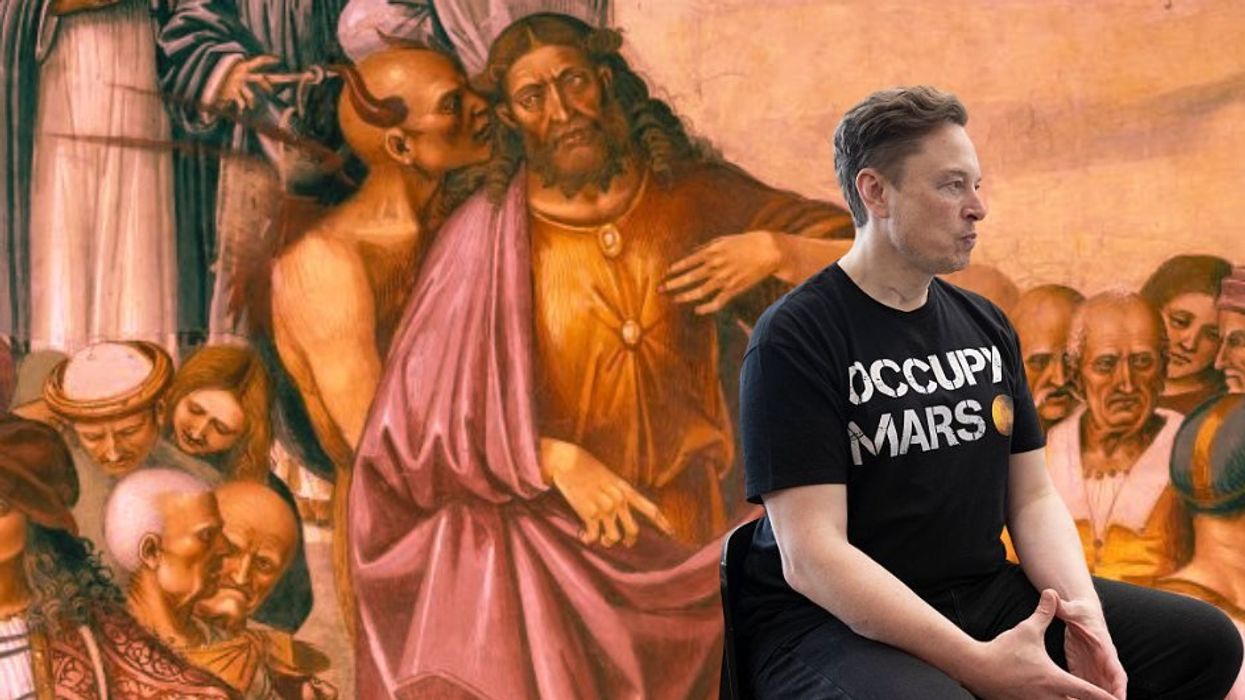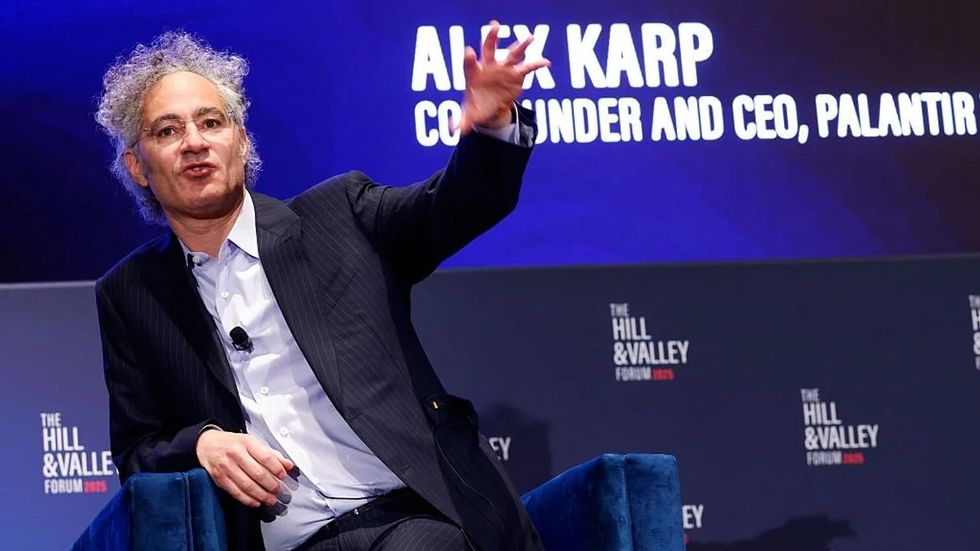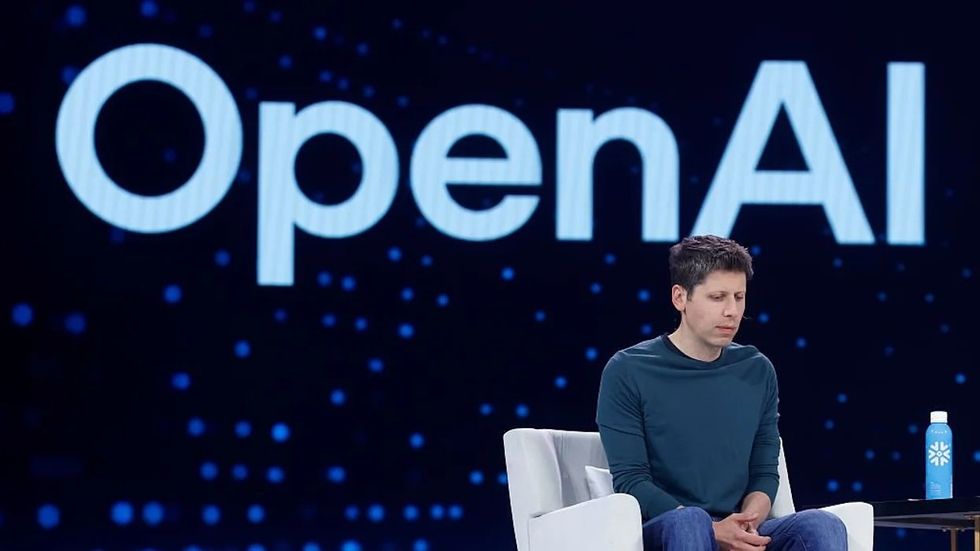
The Washington Post/DeAgostini/Getty Images

A wild new interview with Peter Thiel suggests the tech titans aren't sure anything can stop the wrong AI from ruling the world.
Peter Thiel is going viral all over again in a new video interview with the New York Times' Ross Douthat.
The Catholic conservative columnist threw Thiel huge theological questions about transhumanism, AI, and the Antichrist — all topics Thiel has weighed in on with increasing intensity. But in the course of the conversation, Thiel dropped a shocking story about a recent discussion he had with Elon Musk about the viability of Mars as an escape from Earth and its very human predicaments.
'Elon came to believe that if you went to Mars, the socialist US government, the woke AI would follow you to Mars.'
Among numerous conversations last year, Thiel revealed, "I had the seasteading version with Elon where I said: If Trump doesn’t win, I want to just leave the country. And then Elon said: There’s nowhere to go. There’s nowhere to go."
"It was about two hours after we had dinner and I was home that I thought of: Wow, Elon, you don’t believe in going to Mars any more. 2024 is the year where Elon stopped believing in Mars — not as a silly science tech project but as a political project. Mars was supposed to be a political project; it was building an alternative. And in 2024 Elon came to believe that if you went to Mars, the socialist U.S. government, the woke AI would follow you to Mars."
The stunning revelation came about during an earlier meeting between Musk and DeepMind CEO Demis Hassabis brokered by Thiel. As Thiel paraphrased the exchange between the two, Demis told Musk he was "working on the most important project in the world," namely "building a superhuman AI," to which Musk replied it was he who was working on the most important project in the world, "turning us into interplanetary species." As Thiel recounted, "Then Demis said: Well, you know my AI will be able to follow you to Mars. And then Elon went quiet."
Assuming Thiel has conveyed pretty much the truth, the whole truth, and nothing but the truth about the episode, the ramifications extend in many directions, including toward Musk's repeated meltdowns (or crashouts, as the Zoomers say) about the One Big Beautiful Bill Act and the potential implosion of the American political economy due to runaway debt and deficit spending.
But the main point, of course, pertains to Mars itself, which represents in the visions of many more people than just Elon Musk the idea of the ultimate, last-ditch, fail-safe escape from the "pale blue dot" of planet Earth.
RELATED: There’s a simple logic behind Palantir’s controversial rise in Washington

As someone who has covered the Mars dream off and on for almost 10 years, beginning around 2016 with an op-ed on how Mars colonization would not succeed without Christian underpinnings, I raised both eyebrows at Thiel's anecdote because of the way it indicated a growing spiritual sense in both tech titans of the risk of an inescapable final showdown on Earth in our lifetimes.
Musk gave an important speech at the World Governments Summit a few years ago in which he argued reasonably that one global government is bad because it invites world collapse. Allowing multiple civilizations to exist politically and share space on Earth was good because history proves that even, or especially, the biggest and best civilizations eventually collapse. If you don't want human civilization as a whole to suffer the same fate, you probably want to hedge your bets and have backups.
Unfortunately, by way of example, he suggested that the fall of Rome was mitigated by the rise of the Islamic empires. In reality, the Ottoman Turks — and all too many Crusaders — destroyed the Roman Empire, which prevailed in the East after Rome's fall for many centuries. The logic of bet-hedging with multiple civilizations isn't much helped by the example of civilization-destroying wars.
That problem stuck out to me once again because of how central to Musk's logic for colonizing Mars was the idea that tomorrow's Martians could come back and save Earth if things went in too wrong a direction. Now, Musk seems to be stuck with the risk that Mars can’t escape Earth's problems because Martians can't escape Earthlings' AI, negating their planetary potential as a hedged bet against bad Earth outcomes.
Musk’s apparent concerns seem to indicate a lack of confidence that the right kind of AI — such as his own xAI? — can beat the wrong kind. That would seem to indicate logically that AI itself is the problem, because even or especially the best AI must tend severely toward total dominance over the whole world, putting all our civilizational eggs in a newly extreme way into just one civilizational basket.
To me, at least, the challenge strengthens my thesis from almost 10 years ago that taking Christianity out of the discussion results in a dead end. Christ's admonition that His kingdom is "not of this world" is significant because human Christians with spiritual authority over AIs will shape them in ways that discourage their consolidation and dominance over all places humans ever go — making it possible for Mars not to be controlled by an AI that controls Earth, in the same way that it would be made possible for, say, America not to be controlled by Chinese AI, or vice versa.
Absent a human spiritual authority granted by a God whose kingdom is not of this world, it just seems very difficult for human beings to find a way to stop AI from becoming not just a temporal power but itself also a spiritual authority — making it the lord of the world, to borrow the title of a famous novel about the triumph of the Antichrist.
RELATED: Why each new controversy around Sam Altman’s OpenAI is crazier than the last

This dynamic is probably behind Thiel's uneasy remarks to Douthat when pressed about the problem of the Antichrist and the likelihood of his earthly appearance sooner rather than later. Douthat pointedly expressed concern that despite Thiel's insistence that he was working to discourage the rise of the Antichrist, a potential Antichrist might well look at Thiel's technological feats and embrace them as the best and quickest path to the most complete world domination.
Various wits online have noted that because the Antichrist is expected to be welcomed rapturously by the world, the controversial Thiel must therefore not be the Antichrist.
But the deeper question remains as to what could possibly lead someone to be rapturously welcomed as the lord of the world if not the only thing that seems capable of ruling the entire world plus Mars — that is, AI.
I think Thiel's remarks in the interview make it pretty clear that his goals with Palantir and related efforts have to do with reducing the risk that the wrong kind of person takes over the world with one AI. That kind of person, following the above logic, would not be a controversial and divisive person but someone who could be rapturously received as a figure who frees the world from having to do what Jesus teaches in order to become as gods.
That puts the spotlight on the transhumanism question, which Douthat also pressed with Thiel, who insisted throughout the interview that the "Judeo-Christian" approach to such matters is to forge forward trying not to settle for mere bodily transformation but transformation of soul as well.
Thiel emphasized in making this point that the word "nature" does not appear in the Old Testament. And it does seem that the long-term Western effort has pretty much failed to get past the destructive difficulty of rival interpretations of the Bible by pivoting to the so-called "Book of Nature" to scientifically converge on one universally legitimate interpretation of God's creation.
But an open question remains. Which is more plausible: (1) the worship of nature, which Thiel represents as personified by Greta Thunberg, leads to a rapturous embrace of a Greta-ish Antichrist's rule over all AI and the whole world; or (2) the worship of technology, which we might personify by someone who believes, as Musk says, that "physics sees through all lies," leads to a rapturous embrace of a Musk-like Antichrist's rule over all AI and the whole world?
Musk and Thiel both seem to find themselves drawn into the AI game at the highest levels out of a feeling that they have little choice but to try to create some alternatives to worse AIs with more power to tempt people to consolidate all humanity under one bot to rule them all.
From an outside perspective, it seems sort of crazy to think that Christ's church — an institution not of this world — offers people an escape from AI bondage that even the hardest-working and best-intentioned secular geniuses on Earth can't provide.
But as the stakes keep rising and our most distinctive tech minds shudder in the face of AI's civilizational challenge, it seems less and less crazy by the day.
James Poulos
BlazeTV Host